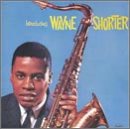| All Artists: Wayne Shorter Title: Introducing Wayne Shorter Members Wishing: 2 Total Copies: 0 Label: Koch Records Original Release Date: 1/1/2001 Re-Release Date: 9/11/2001 Genres: Jazz, Pop Styles: Modern Postbebop, Bebop Number of Discs: 1 SwapaCD Credits: 1 UPC: 099923854722 |
Search - Wayne Shorter :: Introducing Wayne Shorter
 | Wayne Shorter Introducing Wayne Shorter Genres: Jazz, Pop
With this, his November 1959 maiden voyage as a leader, Newark native Wayne Shorter came out of left field with an already mature vision of the saxophone and modern harmony. This rare insight into a jazz icon's early days ... more » |
Larger Image |
CD Details
Synopsis
Amazon.com
With this, his November 1959 maiden voyage as a leader, Newark native Wayne Shorter came out of left field with an already mature vision of the saxophone and modern harmony. This rare insight into a jazz icon's early days comes to us courtesy of Koch Jazz, who have displayed a welcome propensity for seeking out and rescuing a host of abandoned strays from sundry indie and major label kennels, such as this long out-of-print Vee Jay master. And what a find Introducing Wayne Shorter is, just as fresh and swinging and bluesy now as it was some 40 years ago. While the liquid cherry center of Shorter's tenor sound itself was still in its formative stages, the distinctive harmonic outlines of his writing ("Pug Nose") and the elliptical rhythmic and melodic thrust of his lines ("Black Diamond") were already quite assured and engaging, as played in the fast company of fellow Jazz Messenger Lee Morgan and what was then the take-no-prisoners rhythm section of the Miles Davis Quintet: Wynton Kelly, Paul Chambers, and Jimmy Cobb. Despite a clear connection to Coltrane, no one ever seems to pick up on the influence of Lester Young, as seems plainly evident in both the theme and variations to "Blues à la Carte" (whose melodic contours bear a more than passing resemblance to his Jazz Messengers' masterpiece, "Lester Left Town"). The tenor saxophonist's laid-back demeanor; imaginative use of space; long, twisting melodic lines; and proclivity for impressionistic voicings and altered chords mark him as a Lestorian thinker, if not an acolyte. --Chip Stern

 Track Listings (10) - Disc #1
Track Listings (10) - Disc #1